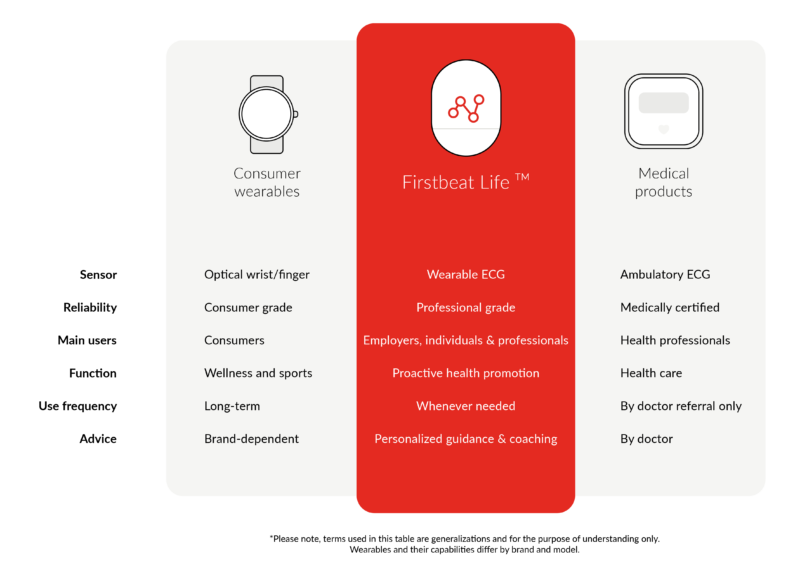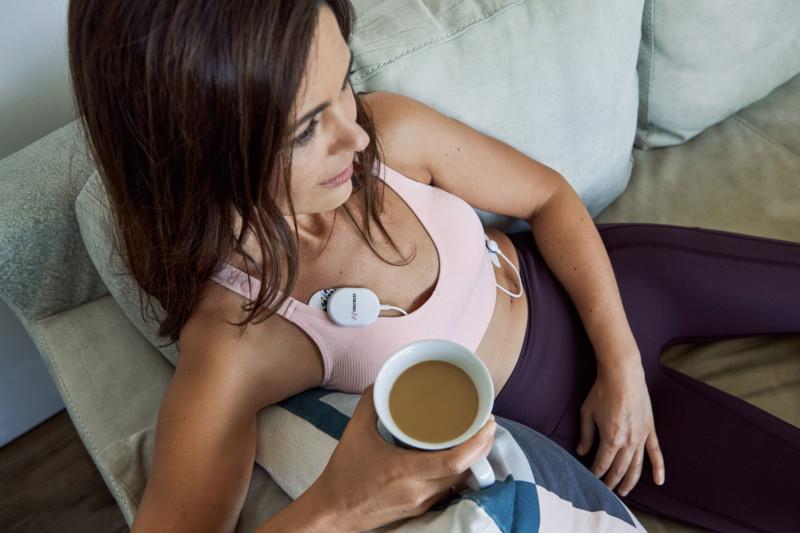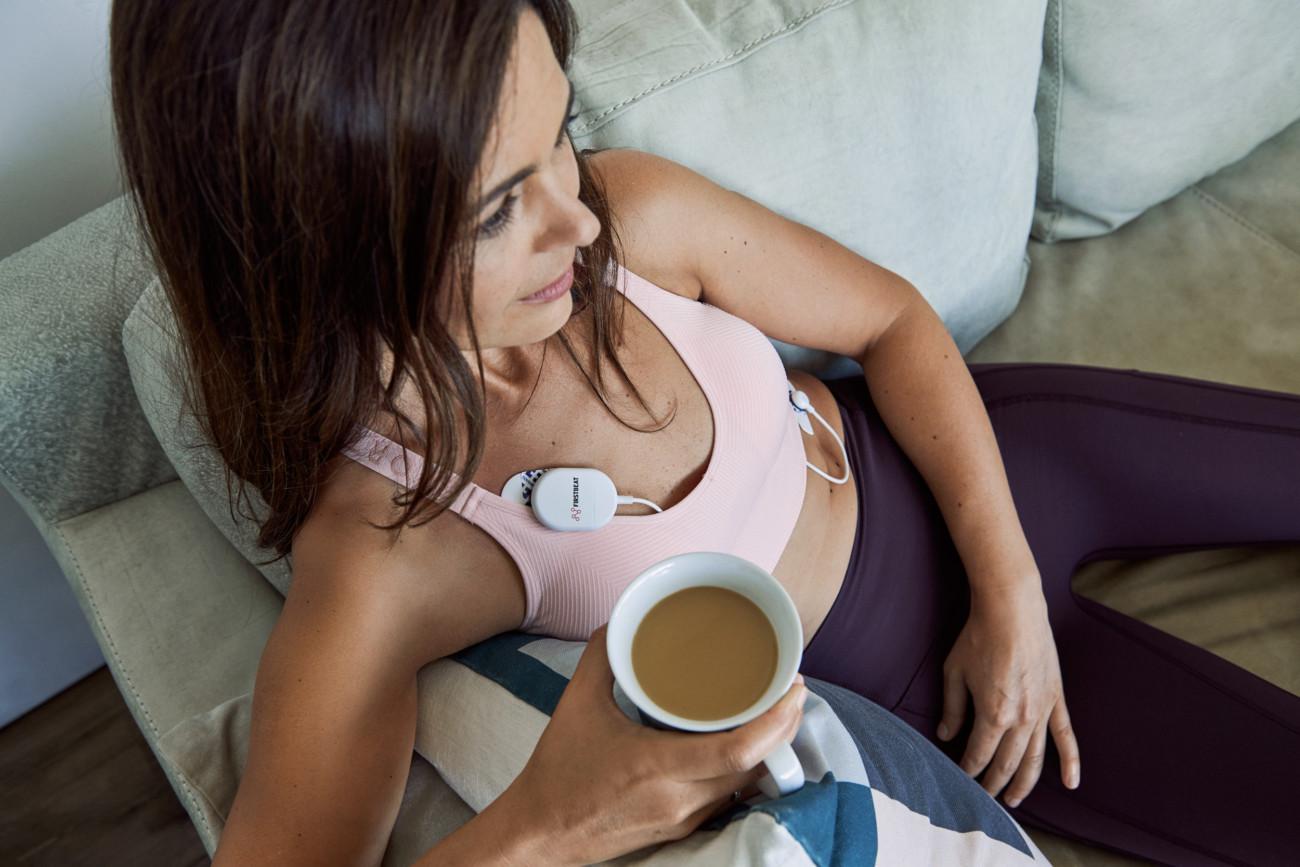
There is a lot of consumer technology available to help you stay fit, so why use a pro-grade health and wellness solution like Firstbeat Life? Here, we explain some of the key differences.
Let’s start with a simple introduction: Firstbeat Life is a health and wellness solution that supports everyone’s personal well-being and promotes healthier lifestyle.
With over two decades of scientific research and development, extensive customer experience and big data analysis of over 600,000 measurements, Firstbeat Life is the most advanced technology available for managing stress and recovery. The personal heart rate sensor and mobile app helps each user monitor personal well-being and learn how to improve health. You get insights into stress, recovery, sleep and physical activity to ensure you stay balanced.
In essence, Firstbeat Life is a new category of digital health promotion between consumer products and medical devices. With measurements lasting from one to five days and with a personal diary of your activities, you get insights you can trust. Instead of just monitoring, you see the connection between your reactions to daily events so you can make proactive choices about your health and well-being.
Why Measure Stress and Recovery in Addition to Sleep and Exercise?
Most wearables focus on exercise, 24/7 activity tracking, or a combination of the two. Firstbeat Life is developed specifically for monitoring and analysing all aspects of stress and recovery to gain a complete picture of your well-being and factors affecting your health. As more and more people struggle with balancing their everyday life in an always-connected world, the impact of stress factors is growing. Wearables often remind and motivate you to be active. Firstbeat Life goes further by also highlighting your balance between stress and recovery, and reasons behind the possible imbalance.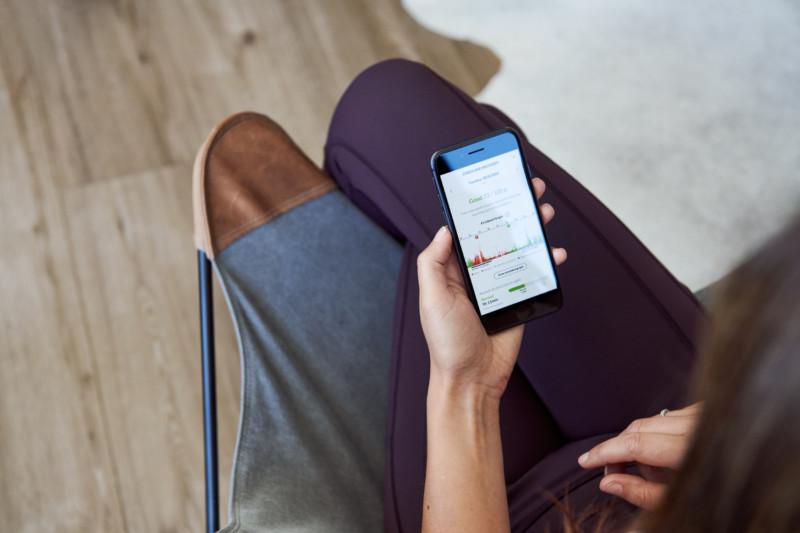
Stress gets a lot of negative press, but it is important to remember that stress is fundamentally necessary. Stress reaction prepares your body to respond to everyday challenges and to perform when necessary. Without stress your performance to challenges might fall short, and complete avoidance of stress would mean avoidance of challenges.
Hence, avoiding stress isn’t the key to good health. Rather, we need to make sure that we let our body rest and recover. The more stress you have, the more important it becomes to give yourself sufficiently long periods of good, quality recovery.
This is where the concept of ‘body resources’ comes into play. Think of your resources as your personal battery. You have a certain amount of energy, and that energy is used to deal with stress. By the end of the day, you’ve used up most of your battery, and recovering is your way to recharge.
Firstbeat Life precisely detects when stress is using up your resources and when rest is helping you recover and recharge. Wearables are good everyday reminders to stay active, but Firstbeat Life looks at your resource balance. The guidance you receive is always based on your personal results, giving you the confidence to know when to push and when to slow down.
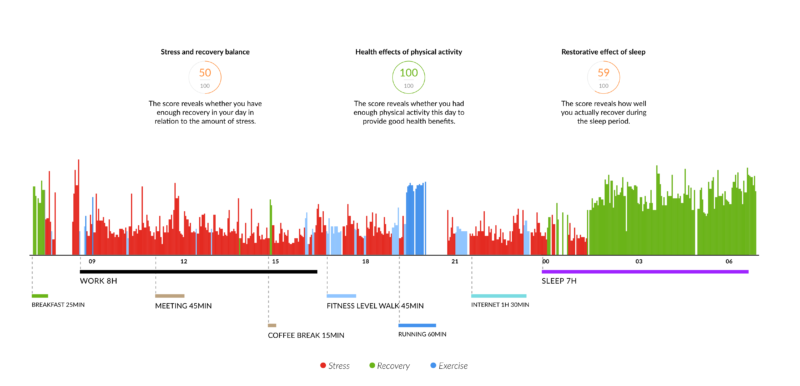
Why Does Firstbeat Life Measure HRV When Wearables Measure HR?
Most wearables only measure heart rate (HR). Particularly for exercising where you are primarily monitoring effort (aerobic vs. anaerobic, heart rate zones, etc.), following HR is enough. Your HR provides a good indicator of how intense the activity is and physical load you are putting on your body.
Firstbeat Life measures HR and heart rate variability (HRV) to achieve high accuracy. HRV refers to the changes in duration between each heartbeat. While both HR and HRV are controlled by your autonomous nervous system, HRV reveals a much more detailed picture of what is happening inside your body, especially when it comes to physiological recovery processes controlled by your sympathetic and parasympathetic nervous systems.
With accurate HRV measurements, we can provide a high-fidelity picture of your physiological state both during activity and at rest. This is made possible by the Firstbeat Life Bodyguard 3 heart rate sensor and electrodes.
Isn’t 24/7 Constant Tracking Better Than a Few Days of Firstbeat Life Data?
Long-term 24/7 monitoring has its upsides and downsides. The potential for improving your fitness is high, but at the same time, if you don’t see positive results, or worse, if you got hooked on those results, wearables can become a source of real stress. Information overload is not healthy.
With Firstbeat Life, measurements last from one to five days and can be taken at a time that best suits you. Think of Firstbeat Life measurements as getting a high-quality studio photo while wearables give you a reasonably good video. Firstbeat Life gives you a clear, focused picture and helps you interpret the details in that snapshot of your well-being.
In contrast, the wearables video shows overall trends in your health – for example, if you are active or sleeping regularly. The video, however, lacks the details needed to determine the causes of the trends (whether good or bad).
With Firstbeat Life, you can explore in depth what actually leads to stress and recovery so you can make proactive changes.
What is the Difference Between a Sleep Tracker and Firstbeat Life Sleep Monitoring?
Short of a full-on sleep lab session, how do you know if you are actually recovering while sleeping? Typical sleep tracking features rely on sleep stages identified by a combination of movement, heart rate and the bedtime window you define yourself. 
Over an extended period of time, the results can help you evaluate trends or identify particularly bad nights. However, because of the monitoring methods, a bad sleep session may not actually be bad, and a good night may feel horrible.
Firstbeat Life takes a different approach because we can rely on the accuracy of the data based on electrical signals. This provides information about your nervous system itself so we can evaluate exactly when you are recovering on a level comparable to a sleep lab.
We go well beyond sleep stages and dive into your parasympathetic and sympathetic nervous system activity. This is what tells us how your daily choices are affecting your body’s ability to recover while sleeping. By identifying minute changes, Firstbeat Life can tell you before you are overloaded that you need to adjust your daily rhythm.
Understanding sleep is much more than measuring your sleep. By measuring your well-being 24/7, Firstbeat Life captures how stress and recovery during the day impact your sleep, as well as how a restless night impacts your performance during the day.
Measuring is Knowing, but What Kind of Guidance Do You Get Compared to Wearables?
Firstbeat Life is first and foremost about helping you balance stress and recovery. With these in balance, it is much easier to maintain or improve your health.
Actionable insights and establishing a proactive mindset are central to the success of Firstbeat Life. Health challenges are presented clearly and personalised insights help users take impactful actions. Wearables can provide support, tips and inspiration – even during training sessions – but these need to be taken with a certain amount of caution since the underlying data may not be accurate.
Even if you are already fit, an avid runner for example, Firstbeat Life gives you a new depth of insight that can help you. The data will show you the full effect training has on our body and the quality of your recovery time.
You don’t just get data from Firstbeat Life. Personal recommendations based on measurement results are available. This includes video recommendations in which Firstbeat experts explain what you could focus on, both in terms of body and mind.
As an additional service, personal coaching via the Firstbeat Life app is available. Employers can also leverage extra Firstbeat services like wellness program kick-offs or lectures about specific health topics.
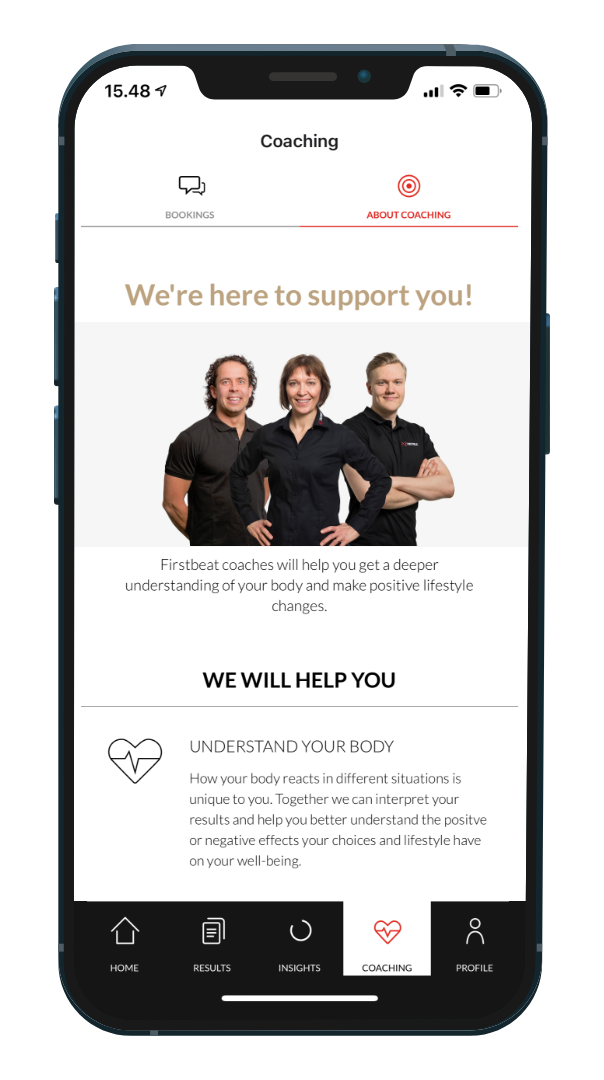
What Makes the Firstbeat Life Heart Rate Sensor So Accurate?
Consumer wearables are easy to use and add a high degree of convenience in activity tracking and exercise monitoring. More recently, optical sensors that monitor heart rate by measuring blood flow with light have become a standard feature.
Optical heart rate sensors are good for following your long-term fitness trends, but measurement uncertainty make it difficult to draw specific conclusions about your health. Flexing muscles, wearing the device too loosely, skin pigmentation and so forth can throw off the sensor readings. Software filters out some of the noise, but you are still left with an estimation based on an indirect measurement of your heart.
Firstbeat Life is all about accuracy. It must be in order to provide the trust and confidence to make decisions about health and well-being. A scientific foundation is backed up by a professional-grade sensor using electrocardiogram (ECG) technology, the gold standard in heart and heart rate variability measurements.
How Can Firstbeat Life Help Me Use My 24/7 Wearable?
Firstbeat Life takes a high-definition picture of your well-being. The details give you a complete picture of your stress and recovery balance. With this information, you can get to the reasons behind why your body reacts the way it does. Once you understand these mechanisms at personal level with a Firstbeat Life ‘deep dive,’ you can use your wearable to follow-up over the longer term.
Especially when it comes to exercising, sports watches are great tools to help you train optimally. Firstbeat Life gives you an important added depth of insight particularly when it comes to recovery. For example, it helps you determine when and how to train in order to recover as well. Have a late run, and Firstbeat Life will tell you how little you recover during the night. You’ll be able to fine-tune your exercise schedule, especially the hard sessions, to maximize recovery.
How Does Firstbeat Life Help My Employer Support Me?
Your well-being and health can benefit from wider support, a key aspect of our social human nature. This is why Firstbeat Life is designed for both personal and community wellness, which differs from wearables which focus only on the individual. 
With anonymous group data from Firstbeat Life, employers can understand trends, identify potential risks and develop workplace well-being and a healthy culture. The data is so accurate that even occupational health professionals and well-being specialists are able to utilize Firstbeat Life.
The well-being of colleagues has a direct impact on us. Firstbeat Life is not only there to help you live a healthier lifestyle, but to ensure your work community is healthy, creating a safety net for your own health.
Firstbeat Life is a truly holistic approach to well-being, encompassing both objective measurements and your personal experiences captured through an in-app diary and wellness questionnaire. We help you and your colleagues get the most out of Firstbeat Life through guided onboarding and activation, as well as personal or group coaching and webinars on topics like stress management. Through personal and group coaching, along with a whole ecosystem of Firstbeat partners, both you and your employer have access to expertise and guidance that goes well beyond technology.
Balancing stress and recovery is on everyone’s agenda. Firstbeat Life offers you a unique capability to succeed in the growing market for proactive health and well-being services. Integrate Firstbeat Life into your services to help your business grow and thrive.
You might also be interested in

Firstbeat Life: How Do You Get Employees Engaged in Corporate Wellness?
When it comes to corporate wellness, one of the most common problems is getting employees engaged. So, what to do? Our specialist gives concrete tips, how to get employees commit to small changes.

Notifications on Poor Recovery: Take a Proactive Approach to Your Health
Physiological data can reveal how your body is coping with everyday life. But how do you know when you need to address certain issues? Personalized notifications in the Firstbeat Life solution let you know when your measurement results need extra attention.

How to Help Your Employees Manage Stress – Tools for the Employer and HR
The word “stress” often has a negative meaning. However, the truth is that without stress we would find it very hard to cope with our day to day lives. Stress…
